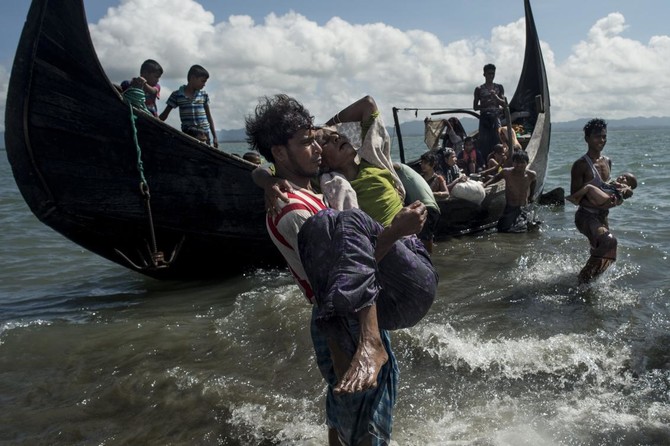THE HAGUE: The International Criminal Court said Thursday it had jurisdiction to probe the forced deportation of Rohingya Muslims by Myanmar’s military as a possible crime against humanity.
Some 700,000 people from the stateless Muslim minority have fled Myanmar’s northern Rakhine state into neighboring Bangladesh since August last year to escape a bloody military crackdown.
The ICC’s “pre-trial chamber... decided by majority the court may exercise jurisdiction over the alleged deportations of the Rohingya people from Myanmar to Bangladesh,” the Hague-based tribunal said in a statement.
The Myanmar government on Thursday declined to comment on the announcement when contacted by AFP.
The move comes days after UN investigators called for an international investigation and prosecution of Myanmar’s army chief and five other top military commanders for genocide, crimes against humanity and war crimes against the Rohingya.
The violence has left a trail of torched villages in its wake, amid allegations of murder and rape at the hands of troops and vigilantes.
In an unprecedented move in April, the ICC’s chief prosecutor Fatou Bensouda asked judges to rule whether she can investigate the deportations as a crime against humanity.
It is a legally complicated request, as Myanmar is not a signatory and member of the Rome Statute which underpins the ICC.
The Southeast Asian nation voiced “serious concern” over the prosecutor’s move, saying that the ICC’s charter in fact did not state that it had jurisdiction to investigate a country that had not signed up to the Rome Statute that governs the court.
Bangladesh, however, is a signatory and the judges said that because the deportations involve a cross-border crime, that gives the court jurisdiction to investigate the plight of the Rohingya.
Bensouda had likened deportation to “a cross-border shooting,” arguing the crime “is not completed until the bullet (fired in one state) strikes and kills the victim (standing in another state).”
Judges rule ICC has jurisdiction over Rohingya deportations
Judges rule ICC has jurisdiction over Rohingya deportations

India plans AI ‘data city’ on staggering scale

- ‘The data city is going to come in one ecosystem ... with a 100 kilometer radius’
NEW DELHI: As India races to narrow the artificial intelligence gap with the United States and China, it is planning a vast new “data city” to power digital growth on a staggering scale, the man spearheading the project says.
“The AI revolution is here, no second thoughts about it,” said Nara Lokesh, information technology minister for Andhra Pradesh state, which is positioning the city of Visakhapatnam as a cornerstone of India’s AI push.
“And as a nation ... we have taken a stand that we’ve got to embrace it,” he said ahead of an international AI summit next week in New Delhi.
Lokesh boasts the state has secured investment agreements of $175 billion involving 760 projects, including a $15 billion investment by Google for its largest AI infrastructure hub outside the United States.
And a joint venture between India’s Reliance Industries, Canada’s Brookfield and US firm Digital Realty is investing $11 billion to develop an AI data center in the same city.
Visakhapatnam — home to around two million people and popularly known as “Vizag” — is better known for its cricket ground that hosts international matches than cutting-edge technology.
But the southeastern port city is now being pitched as a landing point for submarine internet cables linking India to Singapore.
“The data city is going to come in one ecosystem ... with a 100 kilometer radius,” Lokesh said. For comparison, Taiwan is roughly 100 kilometers wide.
Lokesh said the plan goes far beyond data connectivity, adding that his state had “received close to 25 percent of all foreign direct investments” to India in 2025.
“It’s not just about the data centers,” he explained while outlining a sweeping vision of change, with Andhra Pradesh offering land at one US cent per acre for major investors.














